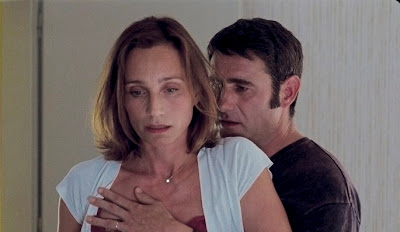
Films about infidelity and crumbling marriages are ten-a-penny, but with high-quality acting and some interesting storytelling choices, Leaving is better than most. The film benefits hugely from having Kristin Scott Thomas in the lead role, an actress who is unquestionably among the finest currently working in cinema. She excels again here, playing the woman whose seemingly perfect life is disrupted by her unexpected lust, then love, for another man. Suzanne Vidal is the wife of Samuel (Yvan Attal), a successful doctor, and she is preparing to return to work herself for the first time in 15 years. Her husband is converting a disused outhouse into an office so she can practice physiotherapy at home, but one of the labourers is Ivan (Sergi López), a Spanish ex-con that Suzanne takes a shine to.
Of course, there's no way this can end well, and director Catherine Corsini opens her film with a scene that imbues every subsequent action with an impending sense of tragedy. Leaving is a film about people being led by their emotions and not taking a second to step back, to consider the consequences, as they find themselves being drawn inexorably along a destructive path. Corsini's direction is detached from the emotional tumult, however. She observes the action in a clinical fashion and often cuts to black at the end of a scene in a manner that recalls Michael Haneke, while slowly detailing the key encounters that see these two very different people falling into each other's arms. There are contrivances involved in the director's narrative – a silly accident is required to allow Suzanne and Ivan some time alone – but Leaving is very effective in its depiction of their animalistic attraction, with the growing sexual tension eventually segueing into passionate coupling, which the director shoots in a frank fashion.
Up to this point, you may think there's not a great deal about Leaving to distinguish it from myriad other bourgeois dramas about extra-marital affairs, but the way Corsini depicts the fallout from this affair is quite interesting. Suzanne may be sexually and emotionally liberated by her relationship with Ivan, but she quickly finds herself a prisoner of the situation this relationship places her in, with the wealthy Samuel exerting his influence and wealth to punish his wandering wife. Samuel continually offers her the opportunity to end the affair and return home, but as she digs her heels in, he seems to take a sadistic pleasure in slowly turning the screw. The downside of this is that Leaving very quickly degenerates into a film about unpleasant people doing unpleasant things to each other in a tit-for-tat manner, but Corsini does find some superb individual moments among them. Many of these involve Suzanne's growing humiliation as she applies for menial jobs or, at one particularly low point, is reduced to selling her jewellery to passers-by outside a petrol station, while the scenes between Suzanne and her husband crackle with tension and animosity.
Attal and López are both excellent in this actors' showcase, but this is Scott-Thomas' film. Her bold performance alternately brings a brittleness and vitality to the character and she remains a mesmerising presence as Suzanne's journey takes her through a series of increasingly painful situations. The greatest testament to her performance is the fact that she keeps us interested in her character even as her behaviour grows increasingly selfish and the film gets more preposterously melodramatic. The climax offers us a clever twist, but it's not one that satisfies or convinces, leaving us with a disappointing ending to a film that had found some interesting wrinkles in an otherwise familiar story.
